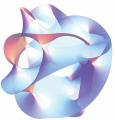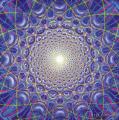
DMT-Nexus member
 
Posts: 4160 Joined: 01-Oct-2016 Last visit: 17-Jun-2025
|
Exitwound wrote:Actually no, laws of physics were changing very very very rapidly during dawn and early expansion of the universe. At least we think so. That was a typo. I meant they likely were not what they are now, then. And Godel is a great example for showing the limits of systems (particularly formal) for the information that can derived from them. One love What if the "truth" is: the "truth" is indescernible/unknowable/nonexistent? Then the closest we get is through being true to and with ourselves. Know thyself, nothing in excess, certainty brings insanity- Delphic Maxims DMT always has something new to show you  Question everything... including questioning everything... There's so much I could be wrong about and have no idea... All posts and supposed experiences are from an imaginary interdimensional being. This being has the proclivity and compulsion for delving in depths it shouldn't. Posts should be taken with a grain of salt. 👽
|
|
|
|
|

DMT-Nexus member
Posts: 178 Joined: 03-Oct-2021 Last visit: 10-Oct-2024 Location: Italy
|
Tomtegubbe, thank you for the explanation. I was doubtful about whether there was some sort of concept of abandonment to suffering, without an escape from it. Instead, the refuge is to recognize these truths (for this kind of vision). Exitwound wrote:
Exactly, I think you nailed it. Not only the general tone, but the words are given different meanings by different parties too, like it was with "hallucination" in this thread.
Yes, everyone has their own life story, with their experiences...even just the mood of the day can influence an interpretation. When I discuss with someone there is something that I always say "maybe tomorrow I'll say the same things you are saying, it's just that today I see it that way".  Exitwound wrote:
It's just a bunch of apes around campfire sharing crazy night time stories Smile Even if we don't come an inch closer to the truth and misunderstand each other, we are still entertained Smile
 Exitwound wrote:
Human thinking tends to fall into opposite polarities, like it's either science is right/has the final say or faith, nothing inbetween. I can see modern science asking more questions about origin of consciousness and "marrying" with mysticism closer, instead of dismissing it completely like ramblings of madmen.
I agree, we need to create an encounter between all visions, paradigms, methods, without discriminating against anything. And also for this reason I approached the world of psychedelics. Surely not for fun 
|
|
|

DMT-Nexus member
 
Posts: 4160 Joined: 01-Oct-2016 Last visit: 17-Jun-2025
|
Exitwound wrote: I think there is no way for us to figure "the truth". Why would you ask? Because Goedel's incompleteness theorem and its implications. This approaches the heart of what I've been getting at. Conditional: When we say "everything is an illusion," our assertion is a statement about how things are. It makes a definite claim. This claim, by what it claims and how it claims, implies that it is true. But if everything is an illusion, then everything is a falsehood, and so everything's truth value is false, including, "everything is an illusion." Any statement that would be made in the illusion are part of the illusion, so are illusory themselves, and as such, false. If we consider what's true as real, what's real as true, what's false as unreal, and what's unreal as false, then an absolute approach saying that everything is an illusion immediately invalidates itself. It's similar to the Cretan saying, "all Cretans are liars." And being uncertain/not knowing doesn't mean that we can jump to the conclusion that everything is an illusion or is false, for making such a claim also claims that that is something that is known. One love What if the "truth" is: the "truth" is indescernible/unknowable/nonexistent? Then the closest we get is through being true to and with ourselves. Know thyself, nothing in excess, certainty brings insanity- Delphic Maxims DMT always has something new to show you  Question everything... including questioning everything... There's so much I could be wrong about and have no idea... All posts and supposed experiences are from an imaginary interdimensional being. This being has the proclivity and compulsion for delving in depths it shouldn't. Posts should be taken with a grain of salt. 👽
|
|
|

DMT-Nexus member
Posts: 788 Joined: 24-Dec-2017 Last visit: 16-Feb-2024
|
You are right, such statements seem to contradict logic and are totally unprovable within the system. Just to clarify: when I say everything is illusion, I mean that everything's basic form is Mind, or immaterial. I don't make statement about "truthfullness", for me it's a different property. I think, material worlds are a subset of the great immaterium set and "condense" from the immaterial energy (with the help of consciousness) and not otherwise (spiritual worlds emerging from the material ones). It just makes a lot of sense to me, that All emerged from nothing and material size of this All(God) is null, but for us it is infinity, as we are part of it. Just feels right, you know? Like a personal postulate  Disclaimer: This is, of course, 1) crazy talk 2) totally unprovable and 3) based solely on personal experiences, gut feelings and some dusty literature 
|
|
|

DMT-Nexus member

Posts: 3090 Joined: 09-Jul-2016 Last visit: 03-Feb-2024
|
Voidmatrix wrote:Exitwound wrote: I think there is no way for us to figure "the truth". Why would you ask? Because Goedel's incompleteness theorem and its implications. This approaches the heart of what I've been getting at. Conditional: When we say "everything is an illusion," our assertion is a statement about how things are. It makes a definite claim. This claim, by what it claims and how it claims, implies that it is true. But if everything is an illusion, then everything is a falsehood, and so everything's truth value is false, including, "everything is an illusion." Any statement that would be made in the illusion are part of the illusion, so are illusory themselves, and as such, false. If we consider what's true as real, what's real as true, what's false as unreal, and what's unreal as false, then an absolute approach saying that everything is an illusion immediately invalidates itself. It's similar to the Cretan saying, "all Cretans are liars." And being uncertain/not knowing doesn't mean that we can jump to the conclusion that everything is an illusion or is false, for making such a claim also claims that that is something that is known. One love Yes. Although i think it is likely that our reality is for a great part an idiosyncratic illusion, the "real world" must also have things in common with that illusion. And for something like a consensus reality to be possible, there must also be something that our shared illusions of objective reality have in common. I think that there most likely are objects outside of us that correspond to objects in the world as we experience it. These real objects could be anything. Even just codes of the matrix. If there are relationships between these real objects that are simmilar to relationships between there corresponding objects in our personal realities, then the picture we think we have of reality corresponds with reality on a structural level and it is also possible to agree with other people on it because we can also create pictures of that reality with language, visual pictures, math or computercode, that share these structural characteristics. A reason to believe that something like this is probably the case, is that there is at least one object that we know realy to exist in both our private reality as in the outside world. And that is the object we refer to as "me". And it is also true that this object can interact with other external objects, like for instance psychedelic drugs, and that these interactions tend to cause undoubtedly real alterations in the prime object, that correspond with the alterations we would expect based on our private beliefs. So that seems to verify to me that there are real objects that correspond to objects in our personal reality, that sometimes have relationships that correspond with the relatiinships their corresponding objects within our personal reality have. The point is ofcourse that all of this still says close to nothing about reality itself. Because we still don't know the exact nature of the real objects and their relationships. To give an example of what i mean: you can disect sentences, arithmetic operations or computercodes to reveal their internal structure. But sentences with corresponding structures can have a totally different meaning. Arithmetic operatiins with an identical structure can have a totally different outcome, etc.
|
|
|

DMT-Nexus member
 
Posts: 4160 Joined: 01-Oct-2016 Last visit: 17-Jun-2025
|
Apologies if I seemed short/rude/curt. It was first thing in the morning and I was/am a little moody. I have nothing but love and respect for you all.  One love What if the "truth" is: the "truth" is indescernible/unknowable/nonexistent? Then the closest we get is through being true to and with ourselves. Know thyself, nothing in excess, certainty brings insanity- Delphic Maxims DMT always has something new to show you  Question everything... including questioning everything... There's so much I could be wrong about and have no idea... All posts and supposed experiences are from an imaginary interdimensional being. This being has the proclivity and compulsion for delving in depths it shouldn't. Posts should be taken with a grain of salt. 👽
|
|
|
DMT-Nexus member
Posts: 575 Joined: 03-May-2020 Last visit: 09-Aug-2025
|
Exitwound wrote:Disclaimer: This is, of course, 1) crazy talk 2) totally unprovable and 3) based solely on personal experiences, gut feelings and some dusty literature  I would like to also subscribe to this perfectly phrased disclaimer  I don't know much, but I do know this. With a golden heart comes a rebel fist.
|
|
|

DMT-Nexus member
Posts: 123 Joined: 31-Aug-2022 Last visit: 04-Apr-2023
|
a little doubt from the start could solve this discussion faster.
|